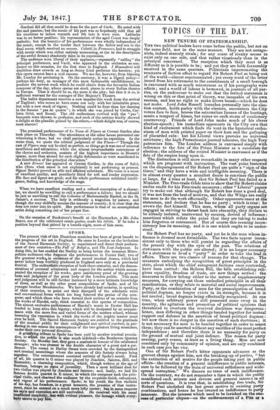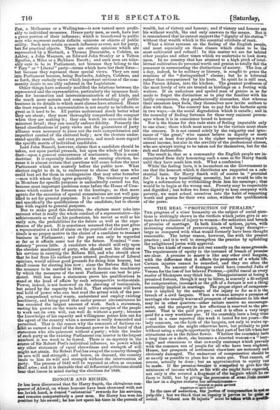TOPICS OF THE DAY.
NEW TENURE OF STATESMANSHIP.
THE two political leaders have come before the public, but not on the same field, nor in the same manner. They are not antago- nists, indeed scarcely rivals ' • for any sense of rivalry seems to exist only on one side, and that rather vicariously than in the principal concerned. The reception which they meet is as different as it is possible to be; and yet they are both favourably received in the same quarters. Politicians impersonating the remnants of faction affect to regard Sir Robert Peel as being out of the world—almost superannuated; yet every word of the letter issued from his retirement to the constituents of a small borough is canvassed with as much minuteness as if his paragraphs were edicts ; and a world of labour is bestowed, in journals of all par- ties, on the endeavour to make out that the retired statesman is wrong on this or that point of theory, was incapable of his own success, and has no right to make divers boasts—which he does not make. Lord John Russell launches personally into the elan:. tion contest, holds parley with the electors, encounters the City voters face to face, braves the saturnalian licence of the hustings, meets a tempest of hisses but raises no such storm of cautionary controversy. Friends of Lord John make much of his clever election-speech ; his immediate opponents in the City own that kind of excitement which finds its vent in the hysterical enthu- siasm of men with printed paper on their hats and the galloping of .placarded cabs: but his Liberal views provoke no universal strictures ; the high Protectionist journal tolerates, the high Tory patronizes him. The London address is canvassed simply with reference to the fate of the Prime Minister as a candidate for election ; the address of the retired Minister is canvassed as if the fate of the empire hung upon it.
The distinction is still more remarkable in many other respects
which are pregnant with instruction. The vast pains bestowed on the disparagement of Sir Robert Peel are quite a "sign of the times," and they have a wide and intelligible meaning.. There is in almost every quarter a manifest desire to convince the public at large, for a time at least, that Sir Robert Peel has failed as a Minister. The Free-trade Globe tries to show that Sir Robert claims undue credit for his Free-trade measures ; other "Liberal" papers try to make out that although Sir Robert has done a good deal, it was not from the best of motives, and that the Whigs are really the men to do the work effectually. Other opponents sneer at the statesman, and declare that he has no party ; which is true: he avows the fact himself. This man,. whom all party organs are engaged in striving to thrust back into obscurity, they aeclare to be already isolated, uncrowned by success, devoid of influence : assertions which refute the pains that they are taking to make him forgotten or contemned. But of course this seeming incon- sistency has its meaning, and it is one which ought to be under- stood.
Sir Robert Peel has no party, and yet he is the man whose in-
fluence is deemed most formidable. The two facts appear incon- sistent only to those who will persist in regarding the affairs of the present day with the eyes of the past. The relations of statesmen with the public are altered; it is no longer necessary for a statesman to head a "party" in order to take the lead in affairs. There are two classes of reasons for that change. The measures embodying the recognition of great principles in the state, about which the chief antagonist factions once contended, have been carried : the Reform Bill, the bills establishing reli- gious equality, freedom of trade, are now things settled : the measures to follow belong either to the nature of supplementary measures, for carrying out those embodied principles in all their ramifications, or they relate to material and social improvements. Party, or the combination of men for the promulgation of broad political dogmas, no longer exists in its strength, because it is not needed ; broad dogmas being effectually recognized. At one time when arbitrary power still possessed some sway in the country, the agitation and promotion of political opinions that threatened to overturn the received doctrines was dangerous : hence, men differing in other things banded together for mutual support and defence in the assertion of broad political dogmas : but now there is no danger in the assertion of such doctrines ; it is not necessary for men to be banded together in order to assert them; they can be asserted without any sacrifice of the most perfect independence; and therefore there is no necessity for party on the ground of mutual and joint defence. The reason for party ceasing, party ceases, at least as a living thing. Men are now combined only by community of opinion, and are only combined in each case pro hac vice.
One of Sir Robert Peel's bitter opponents advances as the
gravest charge against him, not the breaking-up of parties, "but the extinction of all motive for the people taking part in public affairs—the creation of a general indifference to public interests, sure to be followed by the train of universal selfishness and wide- spread corruption." We discern no trace of such indifference. On the contrary, we do not remember a time in which the public manifested such minute and diverse and general interest in all sorts of questions. It is true that, in establishing free trade, Sir Robert Peel abolished the last great motive to existing party combinations, and hence he has created an indifference to party interests. But the interest which used to be lavished on the sus. cees of particular cliques—on the enthronement of a Pitt or S
Fox, a Melbourne or a Wellington—is now turned more profit- ably to individual measures. Hence party men, as such, have lost a great portion of their influence; which is transferred to public men who represent certain definite opinions or objects of public utility. Such men retain as much influence as ever, not for party, but for practical objects. There are certain opinions which are represented by a Roebuck, a Thomas Duncombe, a Cobden, an Ashley, a John Manners, an Edward John Stanley or a Tatton Egerton, a Miles or a Bickham Escott ; and such men are toler- ably sure to be in Parliament, not because they belong to the " Tory " or "Liberal" party—terms which have lost their force—. but because they represent those special views. They are sent into Parliament because, being Roebucks, Ashleys, Cobdens, and so forth, they embody views which important sections of the com- munity desire to see ably enforced in the Legislature. Other things have seriously modified the relations between the represented and the representative, particularly the immense facil- ities for locomotion and intercommunication of all kinds, and the much more minute and complete understanding of public business in its details to which most classes have attained. Hence the trust reposed in a representative is not nearly so indefinite or great as it used to be. All parties understand much better what they are about; they more thoroughly comprehend the compact when they are making it ; they can watch its execution in the minutest detail; they can usually enforce fidelity. Formerly the broad classifications of party views and the guarantees of party
alliance were necessary to piece out the rude comprehension and imperfect control of the electoral body; now the electors under- stand specific results, and even processes, and much more regard the specific merits of individual candidates.
Lord John Russell, however, claims that a candidate should be taken, not upon partial grounds, but upon the whole of his con- duct—upon a general concurrence of sentiments. This is sound doctrine. It is especially desirable at the ensuing election, be- cause it is almost certain that questions will come before the next Parliament which are scarcely before the public now. What electors ought to do is, to endeavour to choose that man who could best act for them in contingencies that may arise hereafter —men with whom they agree generally. The tendency to send in Members for specific purposes is undoubtedly carried too far, because most important questions come before the House of Com-
mons which cannot be foreseen at the hustings; so that mere agents for the execution of special commissions are not well qua- to act for general purposes. It is well to consider precisely and specifically the qualifications of the candidate, but to choose him with regard to general purposes.
But to make good this doctrine, the electors must take into account what is really the whole conduct of a representative—his achievements as well as his professions, his recent as well as his
early acts, the probabilities for the future as well as the expe- riences of the past. It is sometimes assumed that the past gives a representative a kind of claim on the gratitude of electors : gra-
titude is no proper motive in the choice of a candidate to transact business in Parliament ; and the past can only be regarded so far as it affords some test for the future. Nominal " con- sistency" proves little. A candidate who should still rely upon the obsolete machinery of party, who should rest his claims on his services in carrying the Reform Bill, and who should show that he had from his earliest years uttered professions of Liberal opinions, would adduce good grounds for doing him honour, but
stna/1 reason for electing him now ; since the Reform Bill is not the measure to be carried in 1848, nor is faction the machinery by which the measures of the next Parliament can best be pro-
moted. Still less does a statesman prove his qualifications to stand at the head of affairs by such retrospective testimonials. Power, indeed, is not bestowed on the showing of testimonials, but seized by the capacity to hold it. That statesman will have real hold of power who can best read the actual wish of the peo- ple, comprehend actual wants, understand and employ existing machinery, and bring proof that under present circumstances he has executed the largest amount of work. Such a statesman, resting his power on the wants and active energies of the people to work out its own will, can well do without a party ; because the knowledge of his capacity and willingness points him out for the agent of the country when a measure is really demanded and permitted. That is the reason why the remnants of factions ex- hibit so earnest a dread of the dormant power in the hand of that statesman who sits quiescent without a party ; while the leader of such party as the existing Parliament can muster in the largest numbers is too weak to be feared. There is no mystery in the
source of Sir Robert Peel's individual influence, no power which any other statesman of equal shrewdness and strength of will might not attain. Sir Robert Peel has swayed the country through its own will and strength ; and hence, on demand, the country lends to him its will and strength without the intervention of party. The process of 1842 will be repeated as often as occasion shall arise ; and it is desirable that all influential politicians should bear that lesson in mind during the elections for 1848.



























 Previous page
Previous page